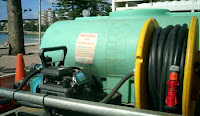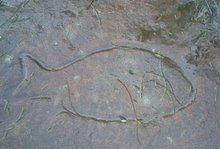 Day two of Manly's Jazz Festival. Car-free for a tiny bit of beach road, pedestrians pushed at the Corso end to the wharf as well against pushy motorists. Maybe, one day they will come around and declare public space for people every Sundays as in other world cities and not just for smelly cars. Maybe the pedestrian areas will truly have no motors in them.
Day two of Manly's Jazz Festival. Car-free for a tiny bit of beach road, pedestrians pushed at the Corso end to the wharf as well against pushy motorists. Maybe, one day they will come around and declare public space for people every Sundays as in other world cities and not just for smelly cars. Maybe the pedestrian areas will truly have no motors in them.
The roaming bands could move with crowds of pedestrians and entertain without the emission intensive stages with hot, blinding spotlights on the audience  (in the day-time), that took days of petrol-fueled erection time. As before - a lot of the amplified music had noise pollution and chemical pollution as a side-effect, as the petrol generators buzzed on. Many push bikes were ou
(in the day-time), that took days of petrol-fueled erection time. As before - a lot of the amplified music had noise pollution and chemical pollution as a side-effect, as the petrol generators buzzed on. Many push bikes were ou t feeling free to move along the beach 'road'.
t feeling free to move along the beach 'road'.
Bad planning, to place really loud amplified music on top of the penguin habitat.
05 October 2008
Manly Jazz Festival
24 September 2008
North Head NP Occupied - More Toxic Diesel in Wildlife Habitat
 North Head, Lady Fairfax walk today. Toilet litter all over on the ground from mass-tourism (without the facilities). The National Parks sign is a sure indicator for what is to be expected: dogs, bikes, litter. The rare Banksia vegetation had been damaged on the 'walkway' by cars. Although there were no black plumes (soot) visible from ocean-going vessels, the entire air around the walk seemed saturated in diesel fumes. And then there it was again - another giant infrastructure development IN the national park, placed on the main 'tourist-attracting' look-out, directly on the cliff of North Head.
North Head, Lady Fairfax walk today. Toilet litter all over on the ground from mass-tourism (without the facilities). The National Parks sign is a sure indicator for what is to be expected: dogs, bikes, litter. The rare Banksia vegetation had been damaged on the 'walkway' by cars. Although there were no black plumes (soot) visible from ocean-going vessels, the entire air around the walk seemed saturated in diesel fumes. And then there it was again - another giant infrastructure development IN the national park, placed on the main 'tourist-attracting' look-out, directly on the cliff of North Head.
Diesel-belching clutter IN the wildlife refuge (NP)
A huge diesel-belching, humming demountable, with a large spinning radar antenna had been placed in the middle of the Sydney Harbour National Park's territory. Seeking to “add value to all aspects of Sydneys port operations... (and) protect the environment and have regard to the interests of the community “, the Sydney Ports Corporation planted this air-conditioned, video and radar surveillance object into a wildlife refuge. This 'state-of-the art' technology (pdf) is to aid in the intensification of trade and logistics from Botany Bay to Sydney Harbour (North Head). Intensify - more for more, 'exploit & open up NPs'
Intensify - more for more, 'exploit & open up NPs'
The “Vessel Traffic Service (VTS) provides active monitoring and navigational advice for vessels in particularly confined and busy waterways with complex traffic movements...Sydney’s ports alone handle over $50 billion of international and domestic trade annually. Total trade through Sydney’s ports was 29.2 million mass tonnes, 5.0 per cent higher than last year.” Obtaining ROI in a harbour full of tinnies is not easy. Infrastructure is likely to be erected in various harbour sites and widening the bays (dredging) is already starting in Botany Bay and elsewhere.
Deadly trade
As in colonial times, the growing population (pdf) is still dependent on the boats coming in, bringing the essentials. Only this time, the huge diesel-powered vessels (container ships, tankers, bunk carriers, tugboats and cruise ships) are costing lives and health. Most diesel powered ocean-going vessels are significant contributers to air pollution in the heads, the harbour, ports and cities. Ports, handling the bulk of imports, are among the biggest sources of air pollution and greenhouse gas emission. “Each step of the goods movement process is powered by diesel fuel, which releases greenhouse gases and toxic, smog-forming air contaminants...ports pose "grave health risks" to millions of people living in metropolitan coastal areas, especially those living nearest the ports." In 2002 "60,000 people living in coastal communities along major shipping routes died from lung and heart complaints as a result of high sulfate emissions from ships". Particulate matter from ocean-going ship causes asthma, heart attacks, hospital admissions, and premature mortality. “Particle pollution from shipping to tens of thousands of premature deaths each year, most of them along coastlines in Europe, East Asia, and South Asia." This dirty trade is causing harm to public health and to the environment. The ocean, its life and the atmosphere becoming degraded
The ocean, its life and the atmosphere becoming degraded
"Ships use the tar-like, sulfur-concentrated remains of petroleum left once the gasoline, oil and all other products have been extracted. This high-sulfur fuel is responsible for the significant environmental impacts of ship sulfur emissions. Regionally, sulfur emissions contribute to acid rain, which can pollute freshwater lakes and rivers, and damage vegetation." Even cloud formation over the Pacific is influenced by trade-carrying cargo ships powered by diesel engines."The annual costs of sea traffic’s contribution to air pollution, climate change and marine pollution are estimated to amount to 260 billion euro for the world fleet and 57 billion euro for the EU fleet." These 'externalities' are probably not lower for the Asian/Pacific region.
Intensifying diesel-powered traffic that 'costs the Earth' and has negative impacts on the marine foreshore and protected wildlife refuges is unsustainable.
Links:
- International Maritime Organization
- "In accordance with the Australian Government's responsibilities and policies, Australia's obligations under IMO Conventions and AMSA's functions specified in Section 6(1)(a) of the Australian Maritime Safety Authority Act 1990, AMSA coordinates a national pollution prevention and response strategy to protect Australia's marine environment from pollution caused by shipping and related activities. This document lists the prevention components of this strategy, based largely on several IMO Conventions given effect by domestic legislation, implemented and enforced by Commonwealth and State/NT Governments." Protection of the Sea - Conventions and Legislation in Australia, AMSA, Australian Government
- Protection of the Sea (Prevention of Pollution from Ships) Act 1983, NSW
- The National Parks and Wildlife Service, DECC
- National Parks & Wildlife Act 1974
- NCC/NPA Submission to Taskforce on Tourism and National Parks, Submission of The Nature Conservation Council of NSW and the National Parks Association of NSW and the Blue Mountains Conservation Society. 0808, pdf 1,2MB
Update 111008
"The International Maritime Organization on Thursday adopted stringent new controls on airborne pollution from the world’s 300,000 oceangoing vessels. Emissions from ships steaming into ports from Rotterdam to Shanghai to Long Beach, are blamed for about 60,000 premature deaths around the world annually. Sulfur emissions are a major source of airborne fine particulates, which have been associated with pulmonary and cardiovascular disease. In some ports in Europe and in the United States, environmental groups, using the courts, and local governmental bodies have required ships to shut off their engines and plug in to the local electrical grid to keep ship operations functioning while in port." NYT 101008
18 August 2007
Birds, Pests and Petrol Culture at Manly Beach
 A day in Manly today, through the streets parked out with oozing boats. At the beach the spectacle of the day was staged by engineers 'fostering innovation'. A plane twirled in the blue sky, leaving behind thick black plumes of pollution. Greenhouse gas emissions rained on all the spectators. Apart from wasting fossil fuel, paper was thrown about on the beach as part of the 'family fun'.
A day in Manly today, through the streets parked out with oozing boats. At the beach the spectacle of the day was staged by engineers 'fostering innovation'. A plane twirled in the blue sky, leaving behind thick black plumes of pollution. Greenhouse gas emissions rained on all the spectators. Apart from wasting fossil fuel, paper was thrown about on the beach as part of the 'family fun'. AT Manly Village Public School Market, 4x4s parked out the bike path. In the playground a model rubber castle, hurling advertising was erected. Powered, as usual by petrol, exhausts of the motor, pumping non-stop into the playground. Carers did not seem to mind.The market ambiance was ruined by this noise pollution.
AT Manly Village Public School Market, 4x4s parked out the bike path. In the playground a model rubber castle, hurling advertising was erected. Powered, as usual by petrol, exhausts of the motor, pumping non-stop into the playground. Carers did not seem to mind.The market ambiance was ruined by this noise pollution. Manly 'lawn'- transplants looked yellow/white, despite the intensive petrol-watering.Thirsty foreign pansies in plastic planters were hanging out for their next shot of fossil-fuel powered water by Council.
Manly 'lawn'- transplants looked yellow/white, despite the intensive petrol-watering.Thirsty foreign pansies in plastic planters were hanging out for their next shot of fossil-fuel powered water by Council.
At the walk from the beach to Shelly, more trees have disappeared, providing much better views. Weeds spill down the sandstone walls of the 'CABBAGE TREE BAY ECO-SCULPTURE WALK “. Never before have we sighted Indian Mynas there. The absence of trees and increase of weeds must have created the right environment for these pests. Being one of the 'World's 100 Worst Invasive Species' they kill native birds and even Ringtail Possums. Parts of Manly town (Sydney Rd. etc) are already caked in their excrement which has ' the potential to spread disease to people and domestic animals.' The next spectacle is planning to civilise dog owners of Manly. What a task! “The aim of the day.. (is) to promote responsible pet ownership and to encourage pet micro-chipping and registration.” It could be years before dogs, tearing Little Penguin chicks to death can be located in real time and their owners charged. Regular dogs on beaches and National Parks could be traced and fines collected. An instant cure for investment headaches. Wonderful possibilities.
The next spectacle is planning to civilise dog owners of Manly. What a task! “The aim of the day.. (is) to promote responsible pet ownership and to encourage pet micro-chipping and registration.” It could be years before dogs, tearing Little Penguin chicks to death can be located in real time and their owners charged. Regular dogs on beaches and National Parks could be traced and fines collected. An instant cure for investment headaches. Wonderful possibilities.
In the afternoon rare visitors were at the rocky shores. Four Sooty Oystercatchers tried to feed in vain, but were repeatedly disturbed by humans until they finally gave up and flew out to the ocean. Even in protected areas, not many oysters have been left by very hungry and poor Australians. It takes some time for the bird to lever, prise or hammer open the shellfish.They are out of a habitat and are getting rare. In the image they are fleeing Manly.










